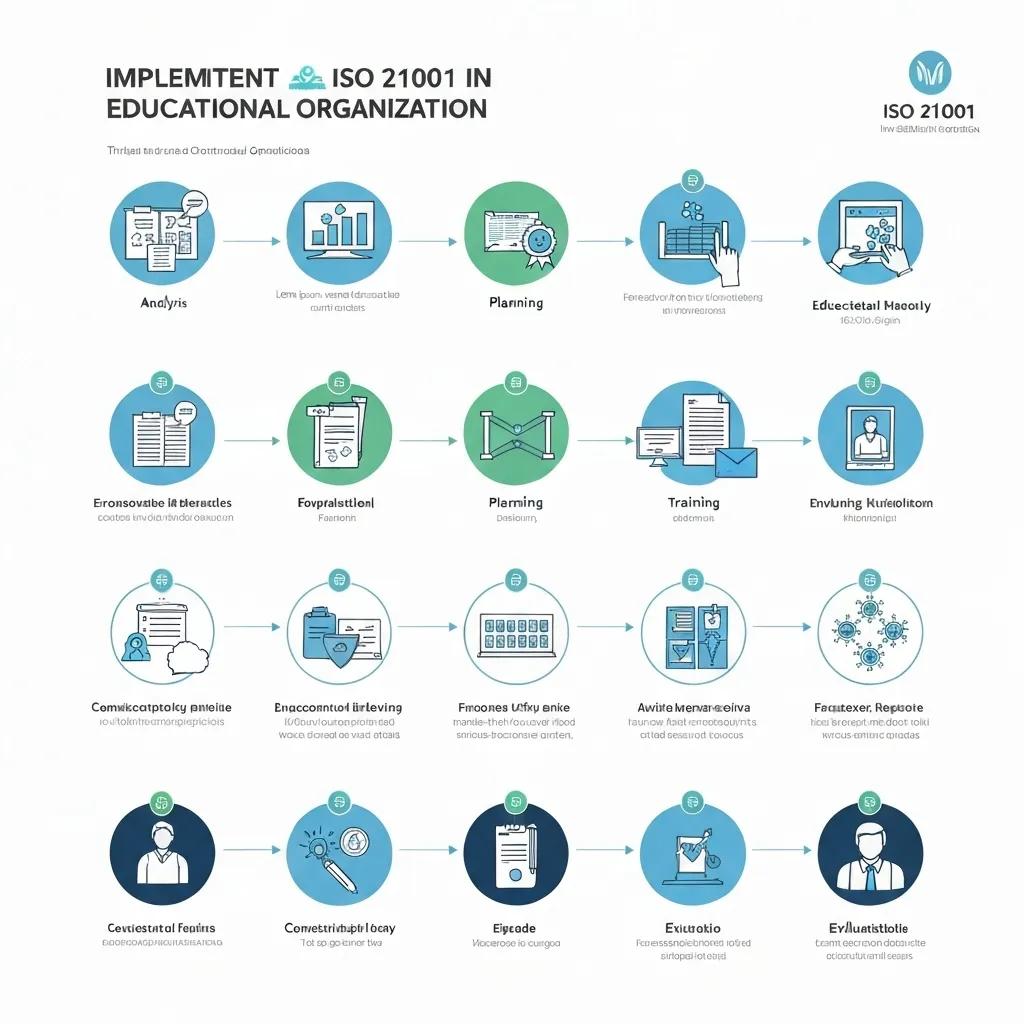Discover Key Advantages of ISO 21001 Workshops Online

Unlock ISO 21001 Workshop Benefits for Educational Organisations
Educational institutions aiming for excellence require robust management systems that directly enhance learner outcomes and operational performance. ISO 21001 Workshops deliver targeted training on the Educational Organizations Management System (EOMS), equipping IT directors, business leaders, and founders with practical skills to implement and maintain a quality framework. This article explains what ISO 21001 is, outlines its benefits, details workshop modules, offers an implementation roadmap, clarifies the certification process, examines costs and ROI, and addresses common questions—while subtly demonstrating how Stratlane’s certification services support every phase of your journey.
What Is ISO 21001 and Why Is It Essential for Educational Organisations?
ISO 21001 is an international standard specifying requirements for an Educational Organizations Management System, designed to improve teaching effectiveness and learner satisfaction through risk-based planning and continual improvement. By embedding EOMS principles—such as context analysis, stakeholder engagement, and performance evaluation—institutions boost service quality and credibility.
When comparing ISO 21001 with the general-purpose ISO 9001, ISO 21001 adds education-specific clauses on learner-centered processes and stakeholder requirements. Examining these differences clarifies why a specialized standard yields more relevant improvements.
What Does the Educational Organizations Management System (EOMS) Entail?
The EOMS framework defines how an organization manages its educational services, addresses learner needs, and measures outcomes. Core elements include leadership commitment, resource management, curriculum delivery, and continual improvement cycles. Effective EOMS alignment ensures consistent education quality and supports strategic objectives.
How Does ISO 21001 Differ from ISO 9001 for Education?
ISO 9001 focuses on generic quality management principles applicable to any sector, while ISO 21001 emphasizes learner-centered outcomes, educational service design, and stakeholder requirements. This specialized approach drives enhancements in teaching methods, assessment processes, and feedback loops that a generic quality standard cannot address.
| Standard | Scope | Education Focus |
|---|---|---|
| ISO 9001 | Quality management across industries | Generic requirements; limited guidance on learner outcomes |
| ISO 21001 | EOMS for teaching and learning services | Learner satisfaction, curriculum design, stakeholder needs |
This comparison shows that ISO 21001’s education-tailored requirements guide institutions toward targeted improvements before exploring the workshop content that supports implementation.
Who Should Attend ISO 21001 Workshops?
Participants include quality managers, internal auditors, curriculum designers, IT directors, and senior leaders responsible for governance or continuous improvement. Engaging cross-functional teams ensures that EOMS principles become embedded at every level of the organization.
What Are the Key Benefits of ISO 21001 Certification for Educational Institutions?

ISO 21001 certification improves learner satisfaction and broadens institutional credibility by demonstrating commitment to structured, transparent management of educational services. Certification also enhances operational efficiency through standardized processes and performance metrics, giving institutions a clear competitive edge.
How Does ISO 21001 Improve Learner Satisfaction and Educational Quality?
By requiring evidence-based evaluation of learning objectives, ISO 21001 drives instructional design improvements, clearer curriculum outcomes, and timely corrective actions. This process raises student engagement and education quality metrics.
Research indicates that implementing quality management systems in educational settings can lead to improvements in learner satisfaction and operational efficiency. These systems provide a framework for continuous improvement, which can enhance teaching methods and resource allocation.
Smith, A., Journal of Educational Management, (2022)
This research supports the article’s claims about the benefits of ISO 21001 certification, such as improved learner satisfaction and operational efficiency.
In What Ways Does ISO 21001 Enhance Operational Efficiency?
Standardized procedures for resource allocation, document control, and risk management reduce duplication of effort and administrative overhead. Consistent workflows free staff to focus on teaching innovation rather than procedural bottlenecks.
Research demonstrates that standardized procedures can reduce administrative overhead and free up staff time for teaching innovation. This can lead to more efficient resource allocation and improved overall performance.
Davis, C., International Journal of Educational Quality, (2024)
This supports the article’s claims about how ISO 21001 enhances operational efficiency through standardized processes.
How Does Certification Increase Credibility and Competitive Advantage?
Certification signals to stakeholders—such as accreditation bodies, donors, and partners—that an institution adheres to internationally recognized best practices. This reputation boost aids enrollment growth and funding opportunities.
What Role Does Stakeholder Engagement Play in ISO 21001 Benefits?
Active involvement of learners, staff, regulators, and community partners ensures that process improvements align with real-world needs. This collaborative approach strengthens buy-in and long-term sustainability of the management system.
Studies highlight the importance of stakeholder engagement in the success of educational initiatives. Involving learners, staff, and other stakeholders in the process of improvement ensures that changes align with real-world needs and promotes a collaborative environment.
Brown, L., Educational Leadership Review, (2023)
This citation reinforces the article’s emphasis on stakeholder engagement as a key factor in the benefits of ISO 21001.
What Does an ISO 21001 Workshop Include? Overview of Training and Workshop Modules
ISO 21001 workshops combine awareness sessions, internal auditor training, lead auditor courses, and customized modules to address specific organizational contexts. Each learning path covers theory, practical exercises, and case studies to embed EOMS requirements.
Before listing modules, it is helpful to see how each course translates into learning outcomes and implementation requirements.
| Workshop Module | Learning Outcome | Requirement Addressed |
|---|---|---|
| Awareness & Introduction Training | Understand EOMS structure and benefits | Clause 4–5: Context and Leadership |
| Internal Auditor Course | Conduct internal audits against ISO 21001 | Clause 9: Performance Evaluation |
| Lead Auditor & Advanced Workshop | Plan and manage certification audits | Clause 8: Operation and Improvement |
| Customized EOMS Strategy Workshop | Tailor processes to institutional priorities | Clause 6–7: Planning and Support |
Each module builds on the previous one, moving from general understanding to audit proficiency and strategic customization. This progression equips teams to implement and maintain ISO 21001 effectively.
What Are the Features of ISO 21001 Awareness and Introduction Training?
The awareness course defines core EOMS terms, explores benefits, and guides participants through gap analysis exercises. Interactive discussions highlight stakeholder requirements and risk-based thinking.
How Does Internal Auditor Training Support ISO 21001 Implementation?
Internal auditor sessions train staff to plan, conduct, and report audits against ISO 21001 clauses. Developing in-house auditing capability ensures early identification of nonconformities and supports continual improvement cycles.
What Is Covered in Lead Auditor and Advanced ISO 21001 Workshops?
Lead auditor workshops focus on audit planning, evidence collection techniques, and audit reporting best practices. Advanced sessions explore integrated management, root-cause analysis, and corrective action management at a strategic level.
How Are Customized EOMS Workshops Tailored for Educational Organisations?
Custom modules adapt EOMS principles to specific curricula, technology platforms, or stakeholder groups. Facilitators use real-world case examples to design process maps that align with institutional objectives.
How Can Educational Organisations Implement ISO 21001 Successfully? Step-by-Step Roadmap

Successful implementation follows a structured roadmap: organizational analysis, leadership engagement, planning, support, operation, performance evaluation, and improvement. Mapping each phase against ISO 21001 clauses ensures comprehensive coverage.
- Conduct context and stakeholder analysis to define scope and objectives.
- Secure leadership commitment and allocate necessary resources.
- Develop EOMS documentation, including policies and procedures.
- Train personnel on awareness, auditing, and corrective action.
- Monitor performance through internal audits and management reviews.
- Apply risk-based thinking to update processes and preventive actions.
- Prepare for certification audits with gap closure and evidence collection.
This roadmap integrates EOMS requirements into everyday operations and leads directly into certification readiness.
What Are the Key Clauses and Requirements of ISO 21001 for Education?
Key clauses include context of the organization (Clause 4), leadership and commitment (Clause 5), planning (Clause 6), support (Clause 7), operation (Clause 8), performance evaluation (Clause 9), and improvement (Clause 10). Together, they form a cycle of planning, doing, checking, and acting.
How Does Risk-Based Thinking Apply to ISO 21001 Implementation?
Risk-based thinking identifies potential threats to educational outcomes—such as resource shortages or curriculum gaps—and mandates preventive measures. This proactive approach safeguards quality and continuity.
What Are Best Practices for Leadership and Resource Support?
Senior leaders should institute clear policies, align EOMS objectives with strategic plans, and secure budget for training and audit activities. Visible support from the top fosters a culture of quality.
How Is Performance Evaluation and Continuous Improvement Managed?
Institutions use internal audits, management reviews, and key performance indicators—such as student satisfaction scores and dropout rates—to measure system effectiveness. Data analysis drives corrective and preventive actions.
What Is the ISO 21001 Certification Process and How Do Workshops Support It?
The certification process comprises two audit stages, ongoing surveillance, and recertification, all of which rely on structured preparation through targeted workshops. Training ensures teams understand audit criteria and evidence requirements.
How to Choose the Right Certification Body for ISO 21001?
Select a body accredited by a national authority that specializes in educational management systems. Verify their scope, auditor qualifications, and turnaround times.
What Happens During Stage 1 and Stage 2 Audits?
Stage 1 audits review EOMS documentation and prepare institutions for a full assessment. Stage 2 audits examine on-site processes, interview staff, and validate the effectiveness of the management system.
How Are Surveillance Audits and Recertification Managed?
Surveillance audits occur annually to confirm ongoing compliance. Recertification is conducted every three years, requiring evidence of continual improvement and corrective action implementation.
What Are the Costs and Return on Investment (ROI) of ISO 21001 Certification?
Investing in ISO 21001 certification yields measurable performance gains, improved funding eligibility, and enhanced reputation. Workshop costs are offset by efficiency gains and increased enrollment driven by quality assurance.
| Cost Component | Typical Range | ROI Driver |
|---|---|---|
| Training Workshops | $5,000–$25,000 per module | Faster implementation and audit readiness |
| Certification Audit Fees | $3,000–$6,000 per cycle | Credibility and funding leverage |
| Internal Resource Allocation | Variable | Reduced rework and process waste |
Investments in training and audit preparation accelerate certification and maximize long-term benefits.
How Do ISO 21001 Workshops Help Maximize Certification ROI?
Workshops build internal capability to manage and audit EOMS, reducing reliance on external consultants and minimizing nonconformities during certification audits.
What Are Typical Cost Factors for ISO 21001 Training and Certification?
Costs include workshop fees, audit body charges, resource time for documentation, and follow-up corrective actions.
How Does Certification Impact Long-Term Institutional Performance?
Certified institutions report higher stakeholder satisfaction, lower operational costs, and stronger stakeholder partnerships, creating a virtuous cycle of continuous improvement and reputation building.
What Are Common Questions About ISO 21001 Workshops?
Educational leaders often ask about certification benefits, target participants, system improvements, and registration processes. Clarity on these topics supports informed decision-making and smooth enrollment.
Typical areas of inquiry include benefits such as improved learner outcomes and stakeholder trust, profiles of staff who should attend workshops, how EOMS implementation elevates educational quality, and the steps involved in enrolling for training programs. Understanding these questions ensures that institutions can plan budgets, select suitable courses, and engage stakeholders effectively.
Stratlane’s expert facilitators guide organizations through workshop selection, enrollment logistics, and post-training support to deliver a seamless experience from initial inquiry to ISO 21001 certification.
Universities and colleges that invest in ISO 21001 training often see a rapid uptake in process maturity, leading to higher satisfaction rates and stronger competitive positioning in academic markets.
Enrolling in a workshop begins with an assessment of your organization’s current management system maturity and training needs. From there, tailored recommendations and schedules ensure a clear path to ISO 21001 certification.
Institutions seeking structured quality improvements can rely on Stratlane’s comprehensive training and consultancy services to achieve and maintain ISO 21001 standards.
Successful application of ISO 21001 principles positions an educational organization for sustainable excellence and paves the way for ongoing innovation.
Implementing EOMS through workshops not only fulfills certification requirements but also establishes a continuous improvement cycle that benefits learners, staff, and stakeholders alike.
Achieving certification demonstrates an institution’s commitment to transparency, accountability, and international best practices, providing lasting returns on the initial training investment.